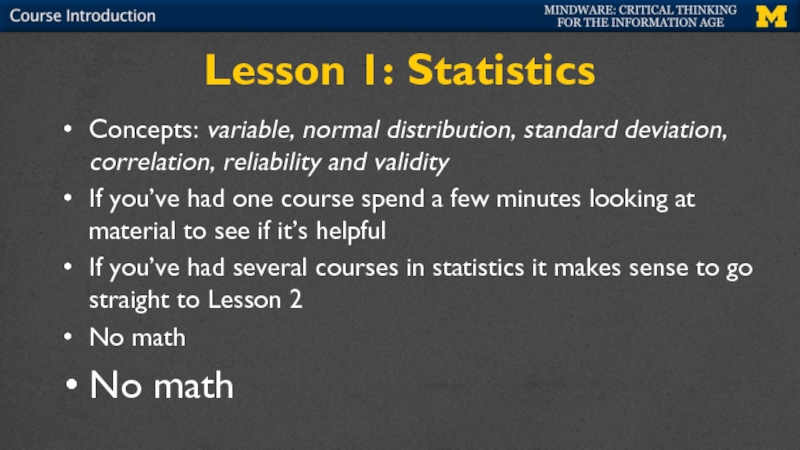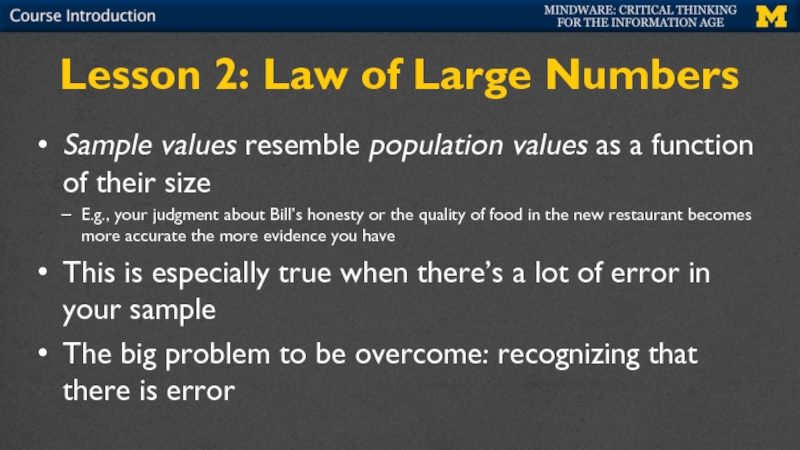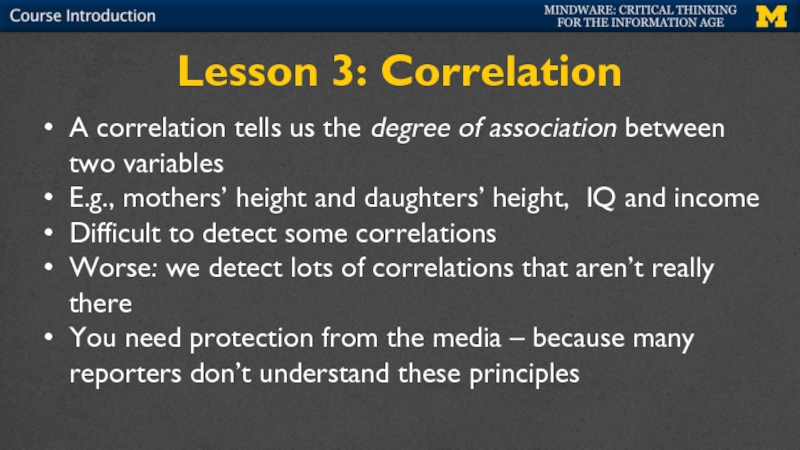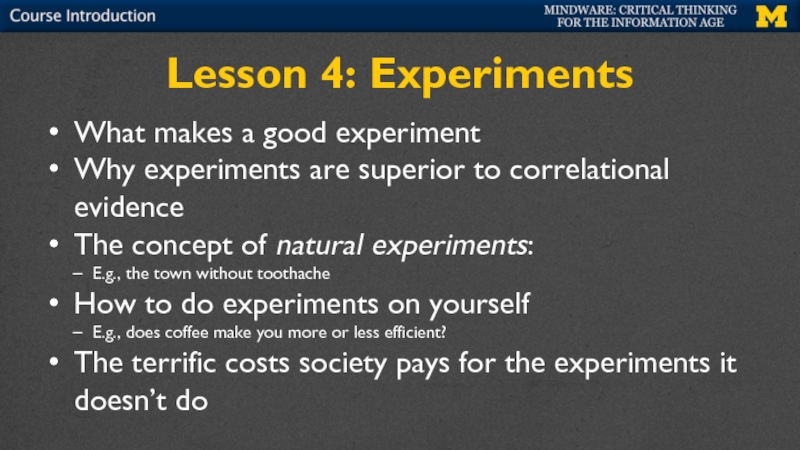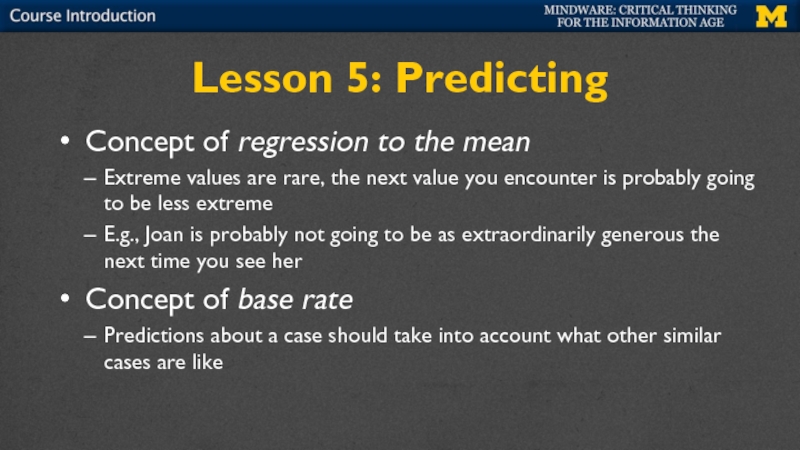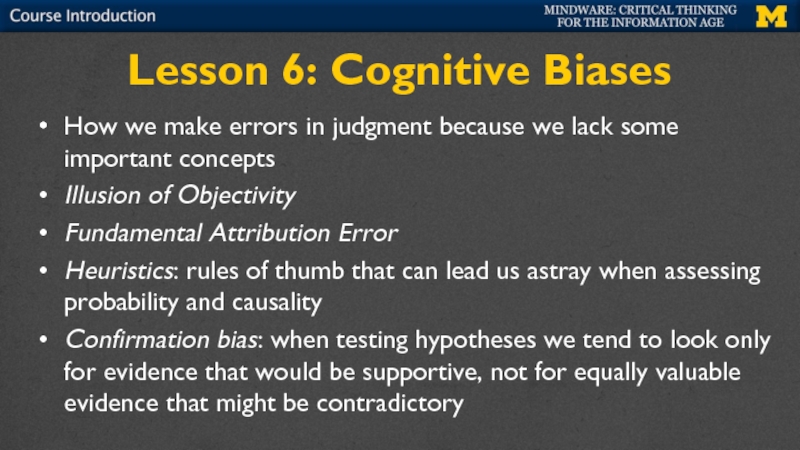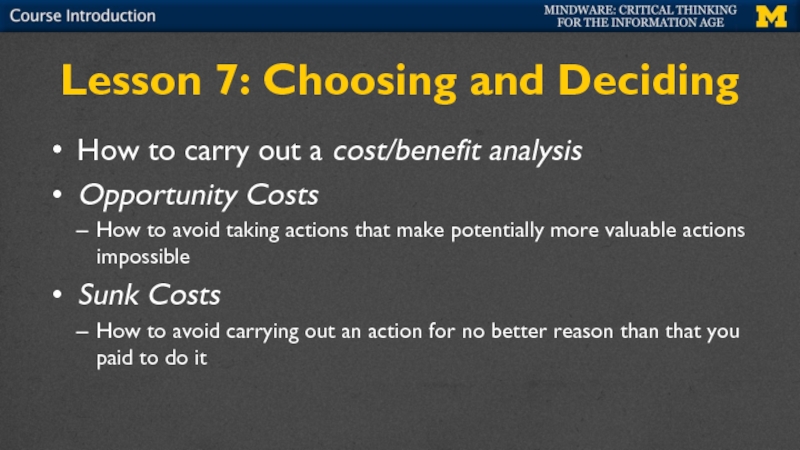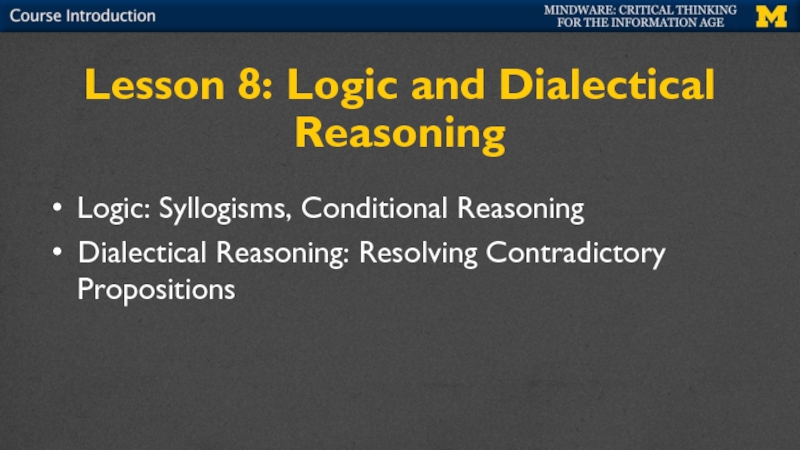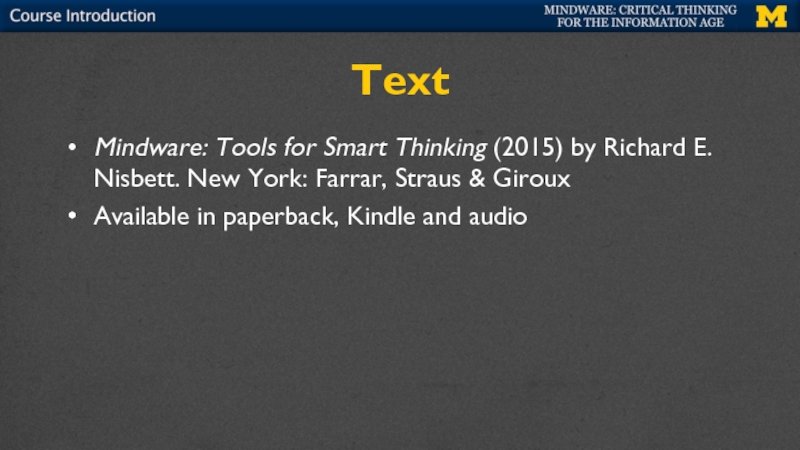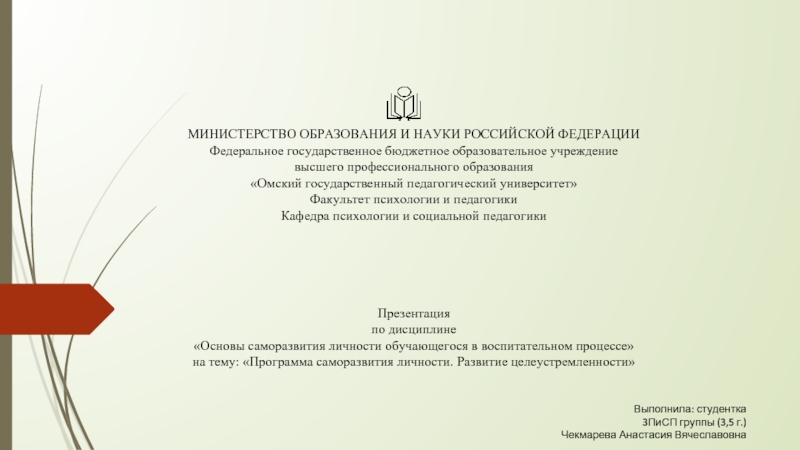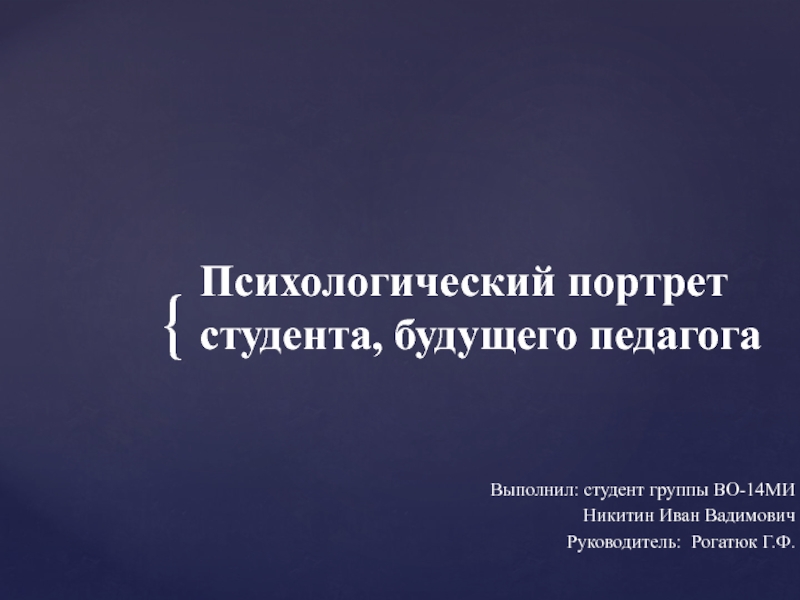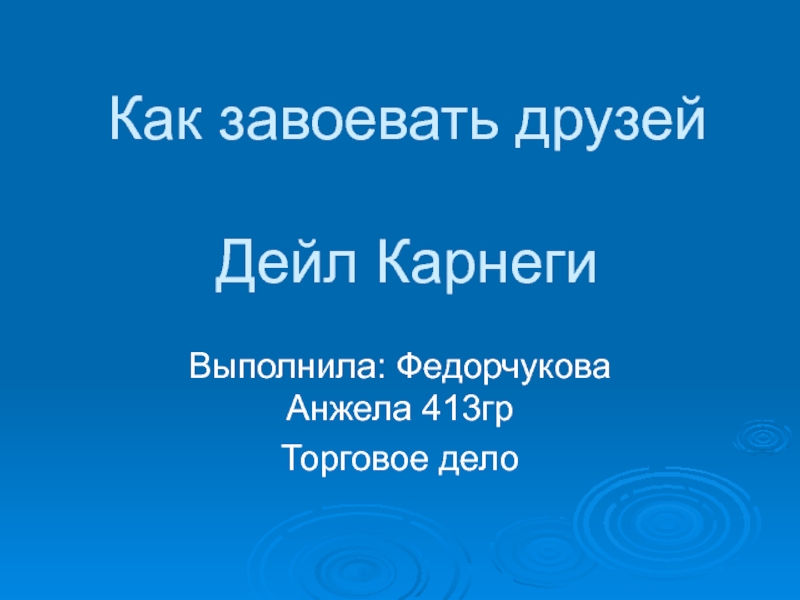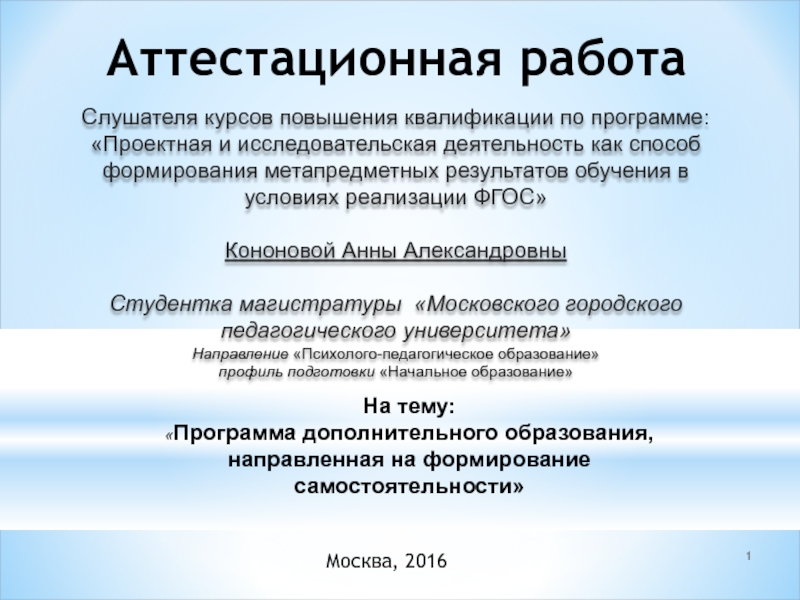- Главная
- Разное
- Дизайн
- Бизнес и предпринимательство
- Аналитика
- Образование
- Развлечения
- Красота и здоровье
- Финансы
- Государство
- Путешествия
- Спорт
- Недвижимость
- Армия
- Графика
- Культурология
- Еда и кулинария
- Лингвистика
- Английский язык
- Астрономия
- Алгебра
- Биология
- География
- Детские презентации
- Информатика
- История
- Литература
- Маркетинг
- Математика
- Медицина
- Менеджмент
- Музыка
- МХК
- Немецкий язык
- ОБЖ
- Обществознание
- Окружающий мир
- Педагогика
- Русский язык
- Технология
- Физика
- Философия
- Химия
- Шаблоны, картинки для презентаций
- Экология
- Экономика
- Юриспруденция
Critical Thinking for the Information Age презентация
Содержание
- 1. Critical Thinking for the Information Age
- 2. Lesson 1: Statistics Concepts: variable, normal
- 3. Lesson 2: Law of Large Numbers Sample
- 4. Lesson 3: Correlation A correlation tells us
- 5. Lesson 4: Experiments What makes a good
- 6. Lesson 5: Predicting Concept of regression
- 7. Lesson 6: Cognitive Biases How we
- 8. Lesson 7: Choosing and Deciding How to
- 9. Lesson 8: Logic and Dialectical Reasoning
- 10. Text Mindware: Tools for Smart Thinking (2015)
Слайд 2Lesson 1: Statistics
Concepts: variable, normal distribution, standard deviation, correlation, reliability and
validity
If you’ve had one course spend a few minutes looking at material to see if it’s helpful
If you’ve had several courses in statistics it makes sense to go straight to Lesson 2
No math
No math
If you’ve had one course spend a few minutes looking at material to see if it’s helpful
If you’ve had several courses in statistics it makes sense to go straight to Lesson 2
No math
No math
Слайд 3Lesson 2: Law of Large Numbers
Sample values resemble population values as
a function of their size
E.g., your judgment about Bill’s honesty or the quality of food in the new restaurant becomes more accurate the more evidence you have
This is especially true when there’s a lot of error in your sample
The big problem to be overcome: recognizing that there is error
E.g., your judgment about Bill’s honesty or the quality of food in the new restaurant becomes more accurate the more evidence you have
This is especially true when there’s a lot of error in your sample
The big problem to be overcome: recognizing that there is error
Слайд 4Lesson 3: Correlation
A correlation tells us the degree of association between
two variables
E.g., mothers’ height and daughters’ height, IQ and income
Difficult to detect some correlations
Worse: we detect lots of correlations that aren’t really there
You need protection from the media – because many reporters don’t understand these principles
E.g., mothers’ height and daughters’ height, IQ and income
Difficult to detect some correlations
Worse: we detect lots of correlations that aren’t really there
You need protection from the media – because many reporters don’t understand these principles
Слайд 5Lesson 4: Experiments
What makes a good experiment
Why experiments are superior to
correlational evidence
The concept of natural experiments:
E.g., the town without toothache
How to do experiments on yourself
E.g., does coffee make you more or less efficient?
The terrific costs society pays for the experiments it doesn’t do
The concept of natural experiments:
E.g., the town without toothache
How to do experiments on yourself
E.g., does coffee make you more or less efficient?
The terrific costs society pays for the experiments it doesn’t do
Слайд 6Lesson 5: Predicting
Concept of regression to the mean
Extreme values are
rare, the next value you encounter is probably going to be less extreme
E.g., Joan is probably not going to be as extraordinarily generous the next time you see her
Concept of base rate
Predictions about a case should take into account what other similar cases are like
E.g., Joan is probably not going to be as extraordinarily generous the next time you see her
Concept of base rate
Predictions about a case should take into account what other similar cases are like
Слайд 7Lesson 6: Cognitive Biases
How we make errors in judgment because we
lack some important concepts
Illusion of Objectivity
Fundamental Attribution Error
Heuristics: rules of thumb that can lead us astray when assessing probability and causality
Confirmation bias: when testing hypotheses we tend to look only for evidence that would be supportive, not for equally valuable evidence that might be contradictory
Illusion of Objectivity
Fundamental Attribution Error
Heuristics: rules of thumb that can lead us astray when assessing probability and causality
Confirmation bias: when testing hypotheses we tend to look only for evidence that would be supportive, not for equally valuable evidence that might be contradictory
Слайд 8Lesson 7: Choosing and Deciding
How to carry out a cost/benefit analysis
Opportunity
Costs
How to avoid taking actions that make potentially more valuable actions impossible
Sunk Costs
How to avoid carrying out an action for no better reason than that you paid to do it
How to avoid taking actions that make potentially more valuable actions impossible
Sunk Costs
How to avoid carrying out an action for no better reason than that you paid to do it
Слайд 9Lesson 8: Logic and Dialectical
Reasoning
Logic: Syllogisms, Conditional Reasoning
Dialectical Reasoning:
Resolving Contradictory Propositions
Слайд 10Text
Mindware: Tools for Smart Thinking (2015) by Richard E. Nisbett. New
York: Farrar, Straus & Giroux
Available in paperback, Kindle and audio
Available in paperback, Kindle and audio

